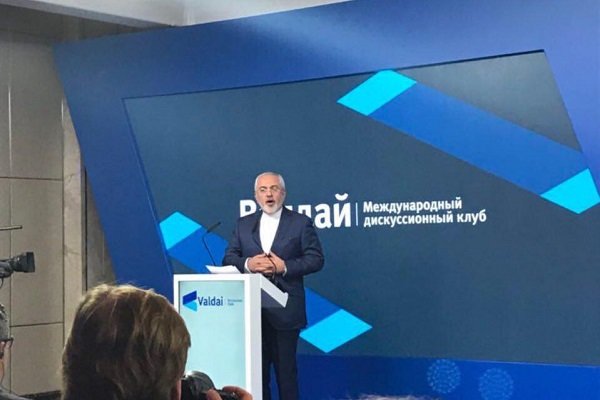Zionist-Saudi hype set to overwhelm Iran's call for 'security networking'

MOSCOW - The Iranian foreign minister took part in a Russian-hosted forum on regional security, the Valdai Discussion Club, on Monday, fast on the back of his attendance at the Munich Security Conference the day earlier.
Many observers at the MSC said Mohammad Javad Zarif had been pressed between two anti-Iran speakers, namely Israeli Prime Minister Benjamin Netanyahu and Saudi Foreign Minister Adel al-Juberi, both of whom did not miss a breath to shout their anti-Iranian propaganda.
There, Netanyahu aired a new episode of his Iran shows, a metal plate which he claimed was part of an Iranian drone downed recently by Israel. The most famous of Netanyahu's Iran shows may be his drawing of a bomb he claimed was nuclear and under development by Iran during his address to the UN in 2012.
Jubeir also did not fail to depict Iran as the one and only cause of concern in the region, leveling at the country whatever accusations he could think of.
Despite all such hard talk, the top Iranian diplomat followed his path of diplomacy, saying after the successful conclusion of the nuclear deal with world powers, his country quickly put forth a proposal to tackle regional issues via dialogue and inclusive participation. He noted that although some regional players failed to consider this security network proposal, it remains "the only game in town" since hard approaches have all come to nothing so far.
In his Monday address in Moscow, Zarif elaborated on what Iran finds of much greater preference over military solutions to the ongoing regional issues. "Insistence on military solutions is a dead-end," he insisted, inviting regional players to stop "making wrong choices such as supporting Saddam Hussein or the Taliban, al-Qaeda, ISIS, or Nusra" and then “instead of looking at the results of their actions” taking the easiest way, namely blaming Russia or Iran.
“We need to establish a new mechanism for security in the Persian Gulf region," he said. "I believe we have to abandon the old ideas.... Collective security, alliance formation, bloc formation have all been led to the production of enemies.... We need to change that logic based on two fundamental concepts. First, we need a strong region, not a strong man in the region.... All of us need to work together in a strong region. Second, we cannot forget our differences. We cannot forget disparities of size and power.... What can we do so that the smaller powers are not afraid of the big powers? Using the old metaphor, we need a network. We need security networking rather than security alliances. We need to move. Security alliances are based on zero sum approach.... And we have done that for a much long time.
"We are ready to take part in confidence building measures.... Confidence building measures can be ambitious, from military visits to reduction of armaments, to transparency in armament procurements.... They can also be modest. The easier to implement, modest ones are promotion of tourism, promotion of economic investment, promotion of joint task forces to give the issues ranging from nuclear safety to disaster management. We can do all of that to pave the way for a regional dialogue forum to advance this cause.”
It seems as much as Netanyahu and Jubeir try to depict Iran as the bully in the region with an iron fist, Iran's insistence is on dialogue, confidence building, and regionally concluded agreements. Iran has already proved its willingness to work for diplomatic and win-win situations like the nuclear deal.
Recently, President Hassan Rouhani expressed grief that the Trump administration, pushed by regional allies not least of which being Netanyahu and Jubeir, has ruined the chance to grab the deal and build atmosphere for talks on more issues.
Despite its experience with the nuclear deal, Iran is still insistent that soft approaches to regional concerns are valuable and worth considering. May the message be taken and the effectiveness of its idea tested.
Leave a Comment